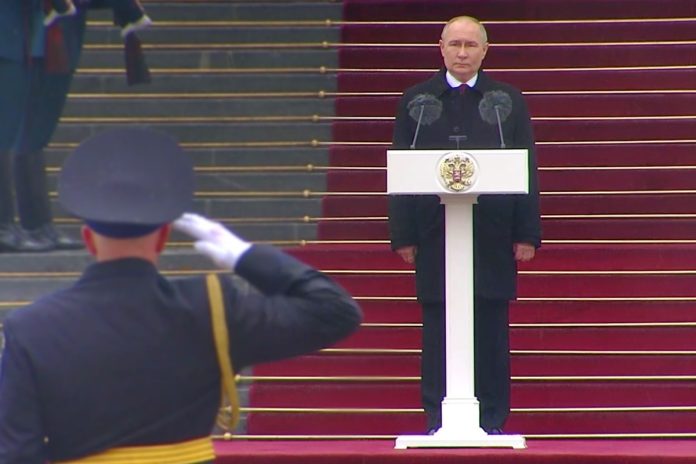Amidst a blend of entrenched tradition and the palpable weight of contemporary geopolitical discord, Vladimir Putin, the seasoned 71-year-old statesman, embarked upon his fifth term as the President of the Russian Federation. The ceremonial inauguration took place on Tuesday, May 7th, 2024, ensconced within the venerable walls of the Kremlin in Moscow. Against the tumultuous backdrop of global diplomatic friction and escalating international tensions, Putin’s ascension to power resonated as a pivotal moment in both Russian and global politics.
Vladimir Putin’s reelection earlier in the year solidified his dominance in Russian politics, with an unprecedented 87.28% of the popular vote, setting a new benchmark in the annals of Russian electoral history. However, the electoral process drew criticism and skepticism from several Western nations and the European Union, leading them to boycott the inauguration ceremony, citing concerns over the fairness and transparency of the election.
The ceremony, steeped in a rich historical legacy tracing its roots to Boris Yeltsin’s second term in 1996, showcased a delicate balance between tradition and innovation. Noteworthy modernizations, epitomized by Putin’s adoption of the revamped presidential vehicle, the Aurus Senat, served as poignant symbols of Russia’s embrace of both its storied past and its aspirations for a modern future. This blend of tradition and modernity underscored the ceremonial significance of the event within the broader narrative of Russian political continuity and evolution.
Nestled within the grandeur of the Grand Kremlin Palace, Vladimir Putin stood amidst a distinguished assembly comprising lawmakers from both chambers of the Russian parliament and revered justices of the Constitutional Court. It was here that he solemnly undertook the oath of office, a pledge of unyielding loyalty to the nation and its people. Administered over a ceremonial copy of the constitution, this oath served as a potent symbol of continuity and unwavering commitment to the principles of legality and governance, amidst the tumultuous currents of contemporary geopolitics.
In the solemn proceedings, Chief Justice Valery Zorkin officiated the ratification of Putin’s fifth term, marking a tenure set to endure for another six years. However, the inauguration transpired amidst the backdrop of worsening relations between Russia and the West, marked by mutual blame and intensifying diplomatic tensions.
In the charged atmosphere of reciprocal allegations, Moscow has vehemently accused Western powers of interference and aggression, contending that the United States and its allies are orchestrating concerted efforts to erode Russian sovereignty through proxy conflicts and punitive economic measures. Conversely, Western nations have condemned Putin’s government for its alleged flouting of international norms, particularly citing the annexation of Crimea, which they assert portrays Russia as a disruptive force within the global arena.
Amidst the diplomatic deadlock, a pervasive atmosphere of distrust and confrontation has taken root, evidenced by reciprocal expulsions of diplomats, punitive economic sanctions, and provocative military posturing. Against this backdrop of geopolitical tension, the specter of a renewed Cold War looms large, marked by the ominous specter of nuclear brinkmanship and the looming threat of regional instability casting a pall over global affairs.
Following Putin’s inauguration, the upper ranks of the Russian government underwent a reshuffling, with Prime Minister Mikhail Mishustin and his cabinet stepping down in adherence to legal requirements. Nonetheless, a semblance of continuity was maintained, as existing government ministers assumed temporary positions until the formation of a new cabinet. This transitional period reflects the procedural intricacies inherent in Russia’s political landscape during moments of leadership transition.
The forthcoming transition to the 18th cabinet of post-Soviet Russia is set to diverge from historical precedents due to constitutional revisions enacted in 2020. These reforms dictate that parliamentary endorsement is requisite for all ministerial nominations, indicating a pivot towards heightened legislative scrutiny and enhanced governmental accountability. This shift marks a notable departure from traditional practices, underscoring evolving dynamics within Russia’s political framework.
With the emergence of the new cabinet, observers are intensely analyzing its ramifications for both Russia’s internal governance and its external positioning on the global platform. This intricate interplay between internal dynamics and external influences illuminates the multifaceted landscape of Russian politics. Shaped by a blend of historical legacies, present-day exigencies, and global power dynamics, Russia’s political tapestry unfolds as a complex narrative, reflective of its evolving role on the international stage.
Against this backdrop, Vladimir Putin embarks on his fifth presidential term, navigating the intricate currents of international politics with a blend of pragmatism, assertiveness, and shrewd geopolitical foresight. The global community observes with rapt attention, fully aware of the profound implications for global stability and the evolving dynamics of international relations in the 21st century. Putin’s leadership will undoubtedly shape the trajectory of geopolitical affairs, influencing alliances, conflicts, and the pursuit of global cooperation.




